#AsiansforBlackLives
Text
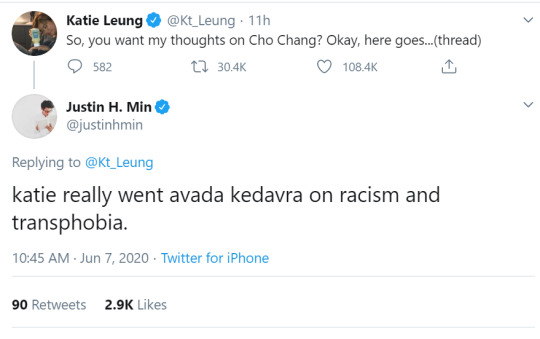
When your favs stan your favs
#katie leung#justin min#justin h min#jk rowling#TERF#transphobia#the umbrella academy#tua#ben hargreeves#cho chang#harry potter#tua season 2#black lives matter#BLM#asiansforblacklives#joanne karen rowling
676 notes
·
View notes
Text
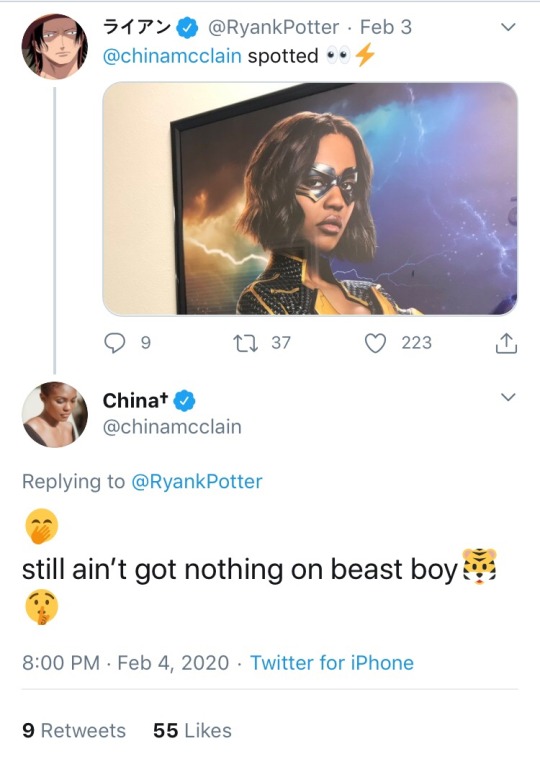
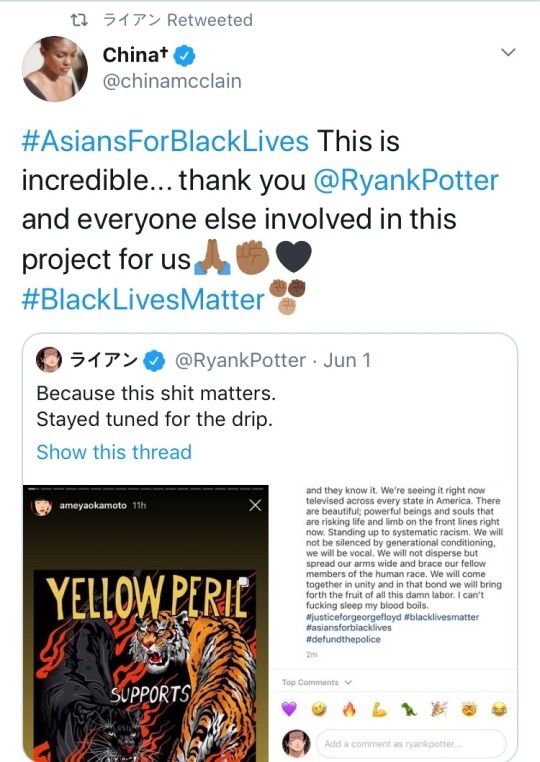
ryan uplifting and supporting china.
#ryan potter#china anne mcclain#titans#black lightning#asiansforblacklives#blacklivesmatter#jen and gar fic maybe??
121 notes
·
View notes
Photo

@emspringerdc: “After seeing the rise in Asian hate crimes for months, and then ATL— the grief that this could be my elders, fam or even me cut deep. To be clear, my proximity to whiteness has afforded me a lifetime of privilege. #Growingupmixed—#AsianAmerican + #White— I’ve rarely been in situations where my fair skin with yellow undertones felt like it mattered. 🏳️🌏 At the same time I am not White. I’ve had people stretch their eyes at me, drop slurs— even had a white kid with a box cutter flash the blade and tell me he was going to kill all Asian people. Was told I was “being sensitive” or that “it was just a joke” if I ever called people out. At the same time I’ve also been told I’m “not REALLY Asian.” The realization that the dominant majority is what caused my mom side to assimilate, forcing her and subsequently me to hide our identity for white comfort disgusts me. While I work through the shame, anger, and grief, finding this community has been incredible. Someone said to me in a forum recently that they’ve stopped calling themselves “half Asian” because they are a whole person. Full stop. Sharing all this here because this space is so needed— thank you for having me and for being here. You all are my whole people. #BLM #stopAsianhate #mixedbutwhole #asiansforBlacklives Resources: @asiansformentalhealth @asians4antiracism @beyonkz" ⠀⠀⠀⠀⠀⠀⠀⠀⠀ ⠀⠀⠀⠀⠀⠀⠀⠀⠀ ⠀⠀⠀⠀⠀⠀⠀⠀⠀ ⠀⠀⠀⠀⠀⠀⠀⠀⠀ ⠀⠀⠀⠀⠀⠀⠀⠀⠀ Check out my How To: Be Featured Story for a Shoutout! ☝️ Following me is required! Want to be featured faster?? Follow and dm my personal page @donnisbutterfly and LET ME KNOW THERE YOU SUBMITTED HERE AS WELL! 💋 #mixedgirlproblem #mixedgirl #white #mixedgirlproblems #black #mixed #biracial #mixedgirlmonday #mixedgirlproblems https://www.instagram.com/p/CSsII6NlED5/?utm_medium=tumblr
#growingupmixed#asianamerican#white#blm#stopasianhate#mixedbutwhole#asiansforblacklives#mixedgirlproblem#mixedgirl#mixedgirlproblems#black#mixed#biracial#mixedgirlmonday
2 notes
·
View notes
Photo
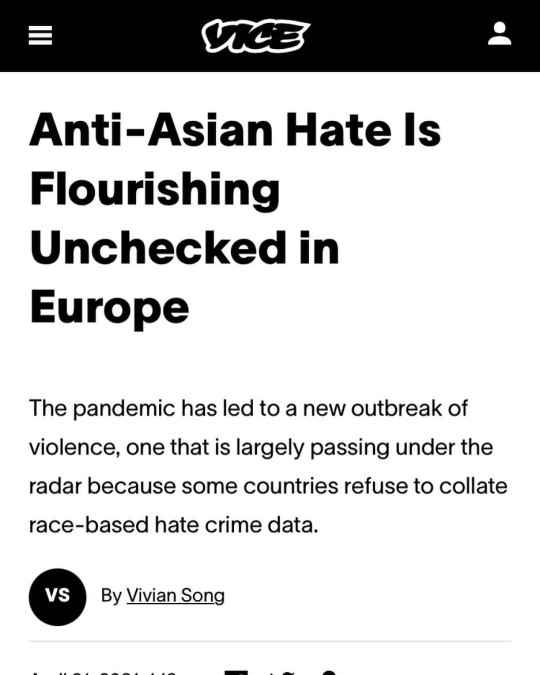
For @viceworldnews I wrote a feature examining anti-Asian hate in Europe, and how its colonial past in Asia (think the Philippines, Indonesia, Vietnam, Laos, Cambodia, Macau...) and post-war histories have led us to this point, where the hate has become visceral and violent. Though some things are nearly universal (turns out variations of "ching chong chang" are as common in Canada and the US as it is here) Asians in Europe face very distinct and unique challenges that make gaslighting a regular occurrence. Writing and reporting this piece meant a lot to me. Grateful to have it out in the world. Link in bio @nextshark @stopasianhate @asianvoiceseurope @asian.raisins @ajcf_fr @asiatiquesdefrance @collectifasiatiqueantiraciste @stop_asiaphobie @racisme_antiasiatique @nbcasianamerica @asiangermany #stopasianhate #stopasianhatecrimes #stopasianracism #aapi #asiansforblacklives #asiandiaspora (at Paris, France) https://www.instagram.com/p/CN7dLBLBMJb/?igshid=o98lcckngfa8
3 notes
·
View notes
Photo
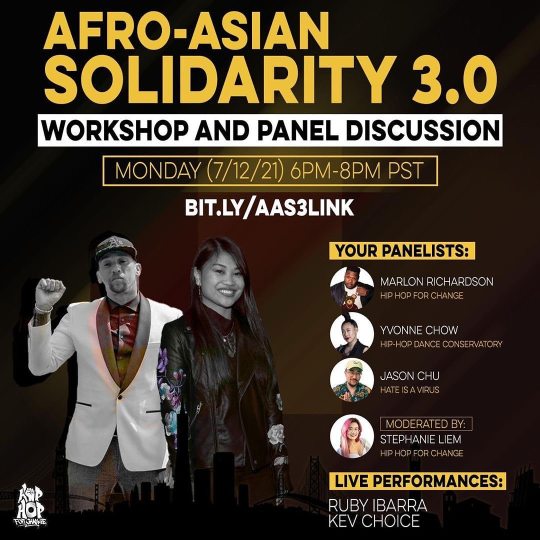
Posted @withregram • @hiphop4change Mark your calendars! Our long awaited Afro-Asian Solidarity event series is coming back July 12th from 6-8PM PST! This event will highlight Hip Hop as the ultimate pathway for solidarity by showcasing live performances from Black and Asian artists, a brief Afro-Asian solidarity workshop hosted by Hip Hop For Change’s very own, Unlearn The World @unlearntheworld and Stephanie Liem @texturecentric, and a live panel discussion asking Hip Hop artists how they see and use Hip Hop Culture as a bridge for multiculturalism and solidarity. This virtual event will be hosted virtually via Zoom and will be free and open to all ages. . RSVP NOW: bit.ly/AAS3LINK . Meet our panelists: @kevchoice @rubyibarra @jasonchumusic @hateisavirus @yvonnechow @hiphopdanceconservatory @unlearntheworld . . #blackandasiansolidarity #solidarity #community #socialjustice #oakland #sanfrancisco #endwhitesupremacy #asiansforblacklives #oaklandchinatown #communitylove #bayarea #wekeepussafe #antiasianracism #asianamerican #afroasiansolidarity #stopaapihate #unity #allyship #hiphopforchange #saveourchinatowns #blacklivesmatter #antiracist #chinatown #blackasianunity #protectourelders #blackmusic #bayarehiphop #localhiphop #nojusticenopeace #hiphopforchange https://www.instagram.com/p/CQzLq5JrA8a/?utm_medium=tumblr
#blackandasiansolidarity#solidarity#community#socialjustice#oakland#sanfrancisco#endwhitesupremacy#asiansforblacklives#oaklandchinatown#communitylove#bayarea#wekeepussafe#antiasianracism#asianamerican#afroasiansolidarity#stopaapihate#unity#allyship#hiphopforchange#saveourchinatowns#blacklivesmatter#antiracist#chinatown#blackasianunity#protectourelders#blackmusic#bayarehiphop#localhiphop#nojusticenopeace
1 note
·
View note
Text
Asians 4 Black Lives: Structural Racism is the Pandemic, Interdependence and Solidarity is the Cure
The COVID-19 pandemic has driven a new surge in violence against Asian communities across the world. Several high-profile instances of anti-Asian racist violence—spurred on by casually racist remarks at every level of government, business, and popular culture—have created a terrorizing climate for many. In San Francisco Chinatown for example, overt xenophobia, combined with the economic impact of shelter-in-place orders, has left immigrants, elders, limited English-speaking people, and poor folks feeling like targets. In San Francisco, where a staggeringly disproportionate 50% of the COVID-19 mortalities are from the Asian and Pacific Islander community, the pandemic has ushered in multiple violences. This has been further exacerbated by pre-existing crises: gentrification, displacement, homelessness, police terror, inequities in education, a drastic uptick in deportations, antagonism against trans and queer people, poverty, and exploitation.
Nationally, Black people are dying from COVID-19 at rates twice as high as other groups, an outcome of deeply embedded structural racism in healthcare, housing, labor, and other policies. Communities are weakened from decades of housing discrimination and redlining, forced denser housing, targeted criminalization and incarceration, larger numbers of pre-existing health conditions, and less access to affordable healthy food. Black communities are more likely to live in places with air pollution, rely on public transit, and be essential workers, so exposure rates increase. When Black people fall ill with COVID-19, racism in the healthcare system means lack of access to quality care, testing kits, or funds for treatment. In some cases, like for Zoe Mungin, they are simply not believed and turned away from treatment, until it is too late.
We must recognize that the scapegoating of Asians as the harbingers of disease and the state violence against Black people (via systemic policing and state response to the pandemic) are two sides of the same coin. This system of oppression is what indicates whether we live or die. This moment makes it even clearer that we must radicalize our communities for cross-racial solidarity.
Asians and Anti-Blackness in the US
Asians in the US are not a monolith. Some of us are first-generation immigrants who came here to work under selective immigration policies that privileged our education and technical skills. Some of us are here through involuntary migrations—fleeing economic and military wars waged in our homelands by the US and other imperial powers. Some of our Asian families have been in the US for generations. Some of us were adopted from Asian countries by non-Asian families. Some of us are mixed-race and of Black and Asian descent. We cannot ignore the varied experiences and distinctions between how our people got to this land, our familial and community histories in the US, and the way in which mainstream American perceptions and portrayals impact us differently. What we do have in common is that we’re incentivized by capitalism and racism, particularly anti-Blackness, to hold up the dual evils of white supremacy and American imperialism.
In order to fight back, we need to be more informed. That means understanding how we’ve been asked to buy into this system and to uphold ideas, policies, and practices that ultimately go against our interests. That also means being active and vocal supporters of Black liberation, and taking responsibility to end our anti-Blackness. We must acknowledge that anti-Blackness is at the core of all racism and that non-Black Asians have benefited—conditionally—from a system of anti-Blackness politically, economically, and socially. See our statement on recent police killings of Black people for more on this. It also means understanding how the history of racial capitalism has impacted all our communities and continues to impact us.
A Shared History of White Supremacy and Imperialism
Today the current administration is seeding a second Cold War with China to protect its financial interests globally and in the Asian Pacific. Stateside, we see results of this expressed as public figures repeatedly call COVID-19 a “Chinese virus” or a “Kung Flu,” directly resulting in vigilante attacks on people of Chinese descent, or people perceived to be of Chinese descent. In the summer, we’re seeing an uptick in COVID-19 cases as states push for “re-opening,” in part so that the state doesn't have to pay the brunt of unemployment benefits. This puts frontline workers (who are disproportionately from communities of color) at further risk—a decision not made off science but because of the drive for profit. In 2014-15, the Ebola outbreak also became a racialized pandemic, sparking widespread fear of African countries and a globalized anti-Blackness by Western countries.
We’ve seen this before: racist rhetoric, scapegoating, and, eventually, military tactics that target and intimidate communities of color to reinforce US capitalist priorities domestically and imperialism abroad. During World War II, fear of military threat by the Japanese government and fear of the economic influence of people of Japanese descent in the US led to the racist mass incarceration of Japanese Americans. Despite this despicable history, racist pundits have recently claimed the incarceration of Japanese Americans actually sets legal precedent for the targeting of other communities of color in the post 9-11 era. US government officials used Southwest Asian, North African, Muslim and South Asian communities as scapegoats during the “War on Terror” which put a huge target on their backs for vigilante violence, created massive surveillance and state-sanctioned harassment programs, and provided a cover for starting endless wars in the Gulf and West Asia for geopolitical dominance. During the rhetoric leading up to the various iterations of Trump’s travel bans we saw xenophobic language like “shithole countries” targeting both Muslim and African countries. We know that within the system of immigration surveillance and detention, Black immigrants are disproportionately targeted and deported.
We also know that the modern US police force was created in the antebellum period as patrols to hunt down people escaping slavery. Their present-day incarnation has been further solidified through continued targeting of Black communities as well as cracking down on unions and workers fighting for fairer wages and decent working conditions. Similarly, prisons are the contemporary progenies of slave plantations. These systems are undergirded by a dominant white supremacist narrative that insinuates Black people are inherently criminal and Black communities and families are irreparably broken. These narratives—built on more than 500 years of slavery, Indigenous genocide, and the theft of Native land—protect white owning-class privilege and power while resulting in death, disempowerment, and suffering, which disproportionately impact Black and Indigenous communities. These dominant systems, and the narratives that support them, have a firm grip on every aspect of contemporary US life. Understanding these critical connections is required political education for all—a more strategic resistance enables growth and strength across multiple communities of struggle. Without this, our communities are more vulnerable to counterproductive responses.
Moving Away from Counterproductive Responses
Unfortunately, in response to the rise in anti-Asian violence during COVID-19, we’ve seen vigilante groups form, bent on taking matters into their own hands. These responses reinforce the violent systems and narratives we want to dismantle. One such group that we’ve learned about in San Francisco Chinatown is composed of some ex-military. They have claimed they would perform citizens’ arrests, and have surveilled people they deem “suspicious,” and called the cops on them. Based on historic biases of the police and military, the folks targeted by this vigilante group have been Black, poor, unhoused, disabled, or a combination of the above. As we’ve seen for decades, police kill Black people at rates six times that of white people. This group has even co-opted language from the movement for Black lives in order to seem more sympathetic. Utilizing policing tactics like “patrols” and engaging in military-style surveillance and harassment of Black and poor people is an escalation and expansion of violence—not successful harm-prevention.
In this moment of the pandemic and uprisings, there is an opportunity to pivot to the future our communities want and need. Rather than attempting to solve the issues we’re facing by using tactics that replicate harm, we ask ourselves and each other: What new systems of support and care can we build and grow so that the world can be better? Asians cannot afford to hold on to the meager protections given to us by white supremacy; we can no longer be conscripted to fight the battles of white supremacy and American imperialism on its behalf while simultaneously being harmed by these systems. We need to recognize that our liberation is tied to our interdependence and solidarity.
Our Liberation is Intertwined
Hyejin Shim, queer Korean and prison abolitionist, poses an essential question: “What are the legacies we’ve inherited, which ones will we choose to protect?” In her piece questioning the limits of Asian American allyship, Hyejin reminds us that as Asian Americans, we have a rich, deep legacy of “Asian American prison abolitionists, anti-war activists, racial justice organizers, disability justice freedom fighters, queer/trans feminists & anti fascists, immigrant rights organizers, housing justice organizers, rape and domestic violence survivor advocates, labor organizers, artists and cultural workers, movement lawyers, and so many more, from both the past & present.” In all of these movements, Asian Americans have struggled alongside their Black siblings, with an understanding that our liberations are intertwined.
Again, Black and Asian solidarity in the face of systemic oppression is not new and we should continue to draw lessons from our vibrant shared history to inform our current and future work organizing for a more just society.
Early 1900s: Black US troops desert to join Pilipino independence fighters.
1969: Black, Asian, and Latinx students at San Francisco State University successfully lead a strike to create the first-ever Ethnic Studies program.
1970s: The Black Panther Party supports Pilipino residents of the International Hotel in their fight against eviction.
2006: After Hurricane Katrina, Black and Vietnamese communities in New Orleans protest the use of their community as a makeshift dump site.
2020: Black and Asian communities in New York lead a movement to Cancel Rent, focused on immigrant, undocumented, and homeless communities.
(For more on the above examples, check out these zines by Bianca Mabute-Louie!)
Grounding in Interdependence and Solidarity
In addition to deepening our understanding of our shared histories, we should deepen our interpersonal relationships—our trust. We should continue to build out the mechanisms through which we tangibly support each other. As Stacey Park Milbern—a dearly beloved queer mixed race Korean comrade and disability justice movement leader who recently passed away—taught us: “We live and love interdependently. We know no person is an island, we need one another to live.”
This month, hundreds of thousands of people flooded the streets, decrying the police murders of George Floyd, Breonna Taylor, and so many more. The people are mobilizing to uplift calls from Black organizers to defund the police while imagining and implementing alternatives to policing that actually promote community health and wellbeing. It’s a beautiful sight to behold and we must not forget that this incredible and rapid mass mobilization is a direct result of the tireless and intentional work of organizers who move in between these flashpoint moments: people who do the unsung work of cultivating and deepening interpersonal relationships over decades, holding difficult and educational conversations, supporting members through personal challenges, and creating venues for community to celebrate victories and accomplishments.
Deep, intentional relationship building is central to laying the foundations that make change possible; at the same time, it is not just a means to an end. Trust and interdependence are ends in themselves. As Asians 4 Black Lives, we aim to live out the world we are fighting for, and our deep comradeship and friendship is core to how and why we show up. For example, we have taken up the practice of beginning each of our regular meetings with personal check-ins: Do you have any needs that our community can help you with? Do you have any resources or bandwidth you can offer to community? We are often wrestling with the complexity of what it means to be people of Asian diaspora living in the United States and in joint struggle with our Black, Indigenous, and other comrades of color. This extends our questioning into deeper political territory: What, if any, is our role as US-based Asians in addressing anti-Blackness in Asian communities abroad? What does it mean to be called #Asians4BlackLives when that phrase is being used as a rallying cry for so many who express their solidarity in ways we may not be aligned with? Our work raises important questions that help us sharpen our analysis and build stronger ties with each other and the communities we are accountable to.
Whatever the world throws at us, be it interpersonal violence, a novel coronavirus, climate change, or vigilante racism, we know that communities are most resilient when basic needs are met. As others have noted, wealthy, predominantly white communities have much lower rates of policing and longer life expectancies than lower income communities of color. This isn’t because rich people or white people are less predisposed to do harm, or because they are physically or biologically predetermined to be healthier, but rather that these communities are allocated more resources and support structures. These communities are given more chances to address violence without being criminalized, but this often empowers people with privilege to continue causing harm without facing consequences. Instead of this model, we strive for a world where everyone’s needs are met and new systems help us address real issues of health and harm without relying on the carceral state.
The good news is we’re seeing more and more Asian communities move towards redistributing resources of time, money, and energy in this moment. Asian volunteers are phonebanking and getting donations pledged to Black groups—directly. Asians are encouraging each other to speak to their families and communities. Asians are supporting the campaigns and creative direct action efforts of Black-led groups to win the defunding and abolition of police and prisons. Asians are setting up strong alternatives to relying on these systems for safety. It is a powerful moment of mobilization.
As COVID-19 shifts social relations in unprecedented ways and oppressive forces leverage the pandemic to stir up fear and anti-Asian racism for their own benefit, we must resist the temptation to put up walls and isolate ourselves. It’s essential that we be resilient and creative in the ways we stay close. Let us continue to deepen our trust and ground ourselves in our rich legacies of solidarity. Let us leverage our collectivizing strength as we fight for a world that centers humanity, dignity, and the space to thrive.
#Asians4BlackLives#AsiansforBlackLives#BlackLivesMatter#BlackHealthMatters#Pandemic#Solidarity#Public Health#Health#COVID-19#COVID19#Coronavirus#Racism#Interdependence#Asians for Black Lives#Black Lives Matter
11 notes
·
View notes
Text

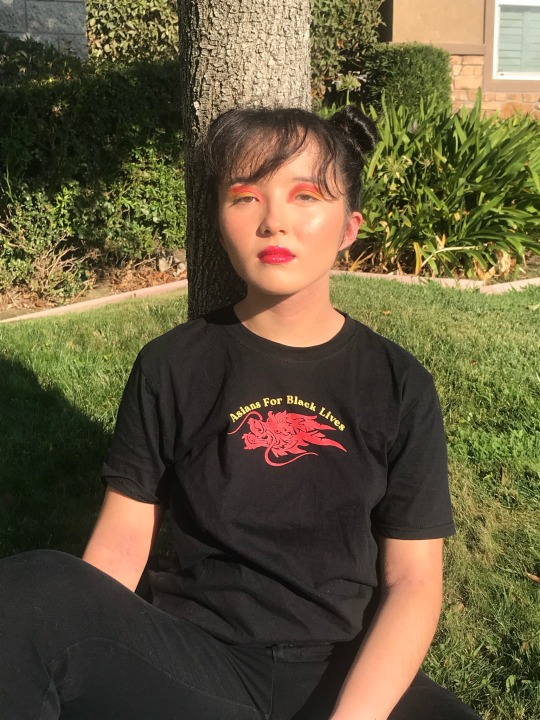
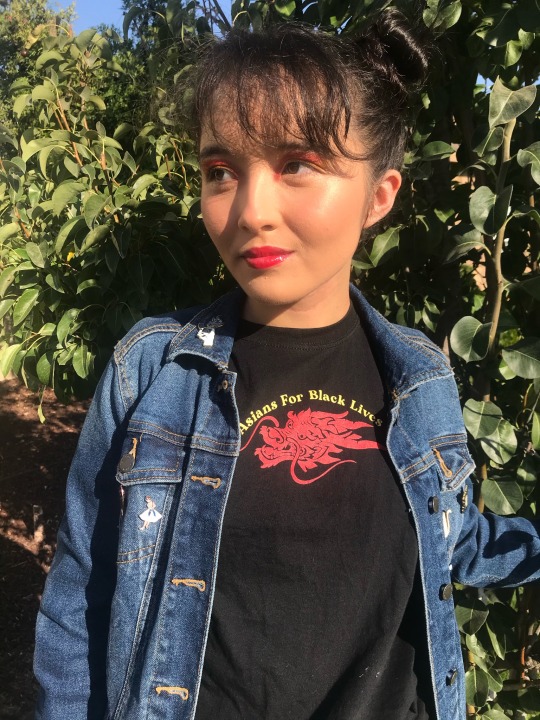
hey y’all! just wanted to let you guys know about this awesome brand that helps support AAPI artists by collaborating with them on all kinds of merch. you can use the code “equality10” to get 10% off of your purchases on https://www.shopaabatteries.com/
with every purchase from the “asians for black lives” collection, proceeds are donated to support the black community and black lives matter.
#asiansforblacklives#asiansforblacklivesmatter#asiansforblm#AAPI#asian american#asians for black lives#asians for black lives matter#black lives matter
5 notes
·
View notes
Photo
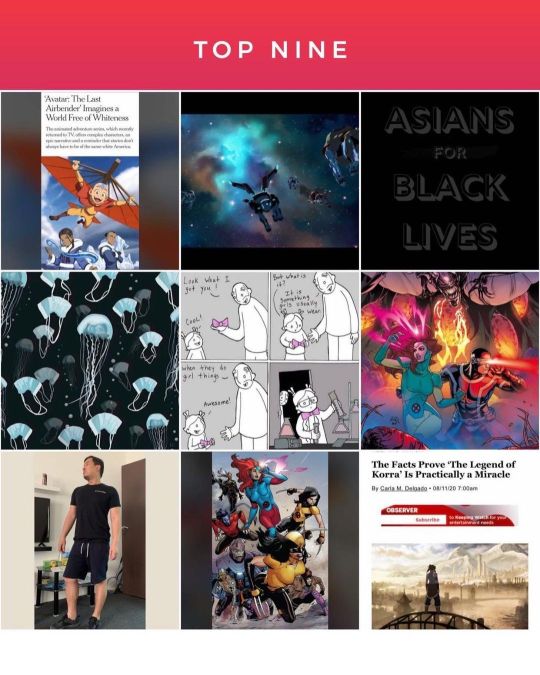
My #topnine for 2020 is all about the stuff I love and doing the right thing. #topnine2020 #bestnine #avatarthelastairbender #voltronlegendarydefender #asiansforblacklives #breakfreefromplastic #feminism #jeangrey #scottsummers #xmen #xmenred #marvel #hikhamsa #mahmudasrar #rdauterman #avatarthelegendofkorra https://www.instagram.com/p/CJbhB3vnL0mRIUV---9IhEtb82667zHVIOLB9g0/?igshid=16bjiwa82oq8
#topnine#topnine2020#bestnine#avatarthelastairbender#voltronlegendarydefender#asiansforblacklives#breakfreefromplastic#feminism#jeangrey#scottsummers#xmen#xmenred#marvel#hikhamsa#mahmudasrar#rdauterman#avatarthelegendofkorra
1 note
·
View note
Text
If you’re Asian and you’re refusing to say something and speak up, if you’re asian and you CONSTANTLY use the excuse “not all Asians are anti-black”, if you’re asian and you HAVEN’T spoken out if your family members, friends, colleagues have said something anti-black, YOU. ARE. PART. OF. THE. PROBLEM.
6 notes
·
View notes
Text
im gonna say this::
black lives matter, and as an asian who face blatant racism on a daily basis, at this point, no, we are not going to tell people that they should foght our battle now when they NEED to fight for black people.
people asked me why i care, because when these poeple never be racist to my black coworker in the open and still have no proplem with these systematic racism. In what world do you think they would care about us? People they berated on a regular basis and brush it off as jokes? what do you think is going to happen if WE finally falls at the other end of these racist events?
black lives matter, because if their don't,ours definitely doesn't.
atleast around me, people respect black people more than asians, so if they dont fight for them, they sure as hell wont fight for me.
so yes, i am fightijg for black people, because they are human who deserves as much rights as those white people. when that improves and settles, we will bring up ours. but now is their time.
5 notes
·
View notes
Text
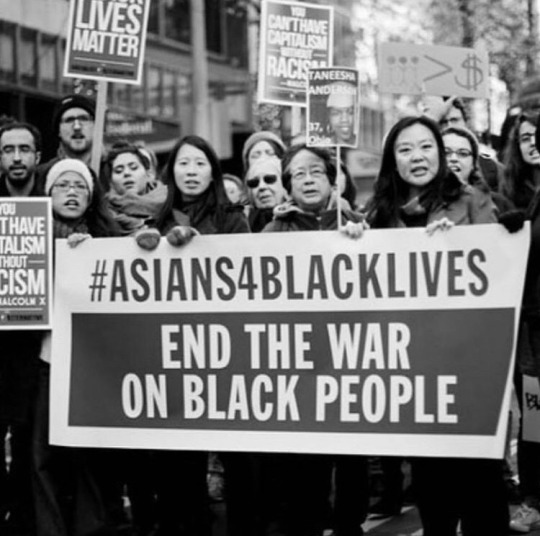
4 notes
·
View notes
Photo
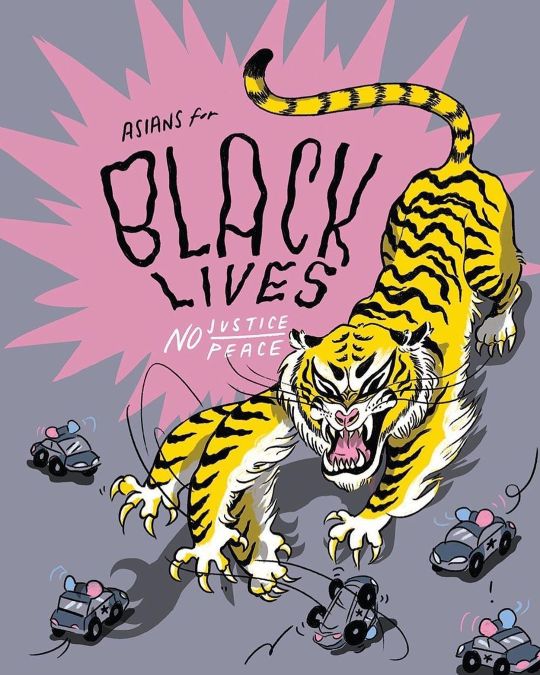
My talented cousin @madcrush_ made this poster to support @blklivesmatter! Love you, cuz! ✊🏿✊🏼🐅 #blacklivesmatter #asiansforblacklives #aapisforblacklives #blm #acab (at All Over the World) https://www.instagram.com/p/CBJGulYDfFj/?igshid=a00sjb7kuh6n
2 notes
·
View notes
Text
Just my thoughts on “allyship”
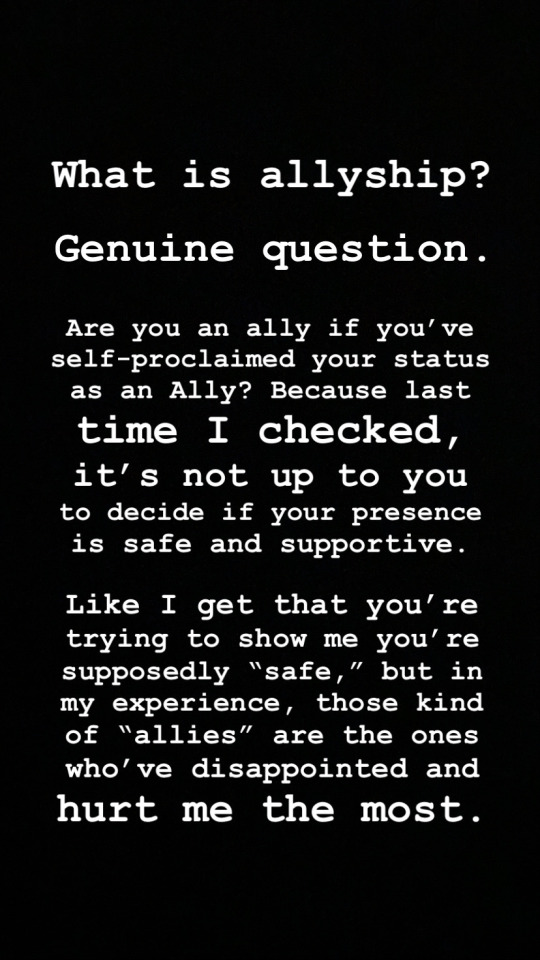
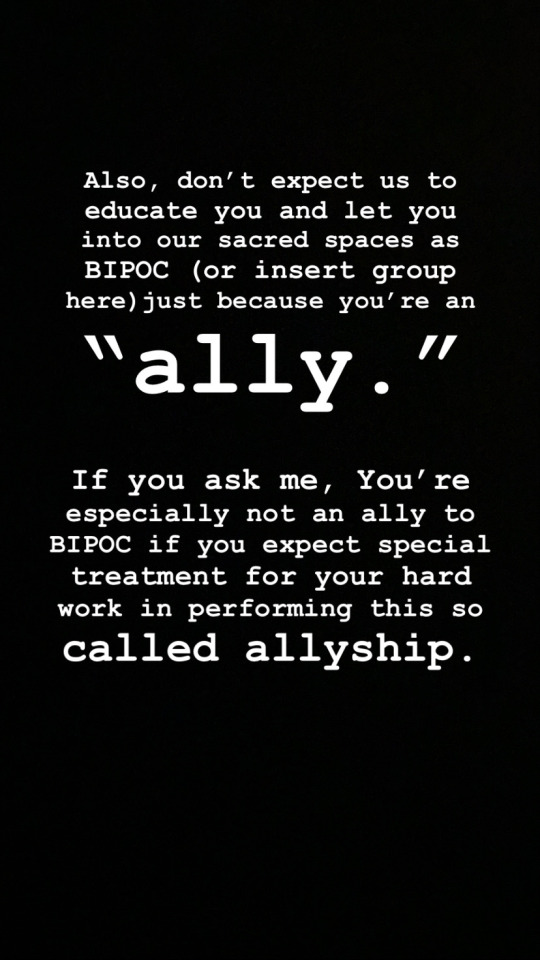

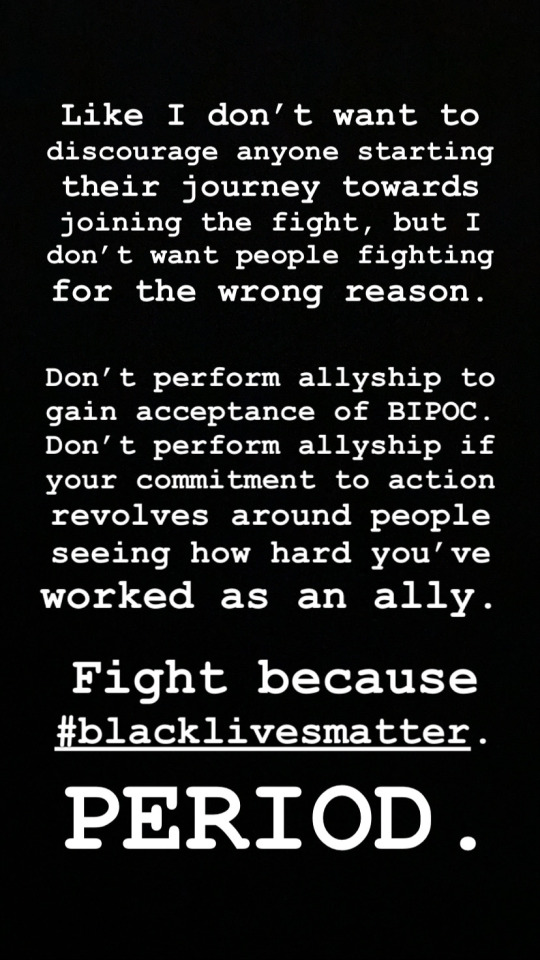
2 notes
·
View notes
Photo
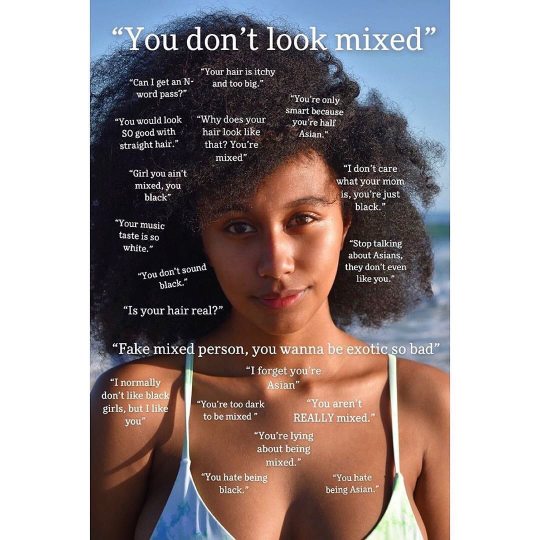
i felt this 🙈😬😩 #repost @theproblackblasian ・・・ Hey so my friend took these really pretty pics of me and since I don’t have a personal IG i decided to put one to use. These are things I’ve been told multiple times about my identity. I always see posts about mixed people not being allowed to identify as black, but I am on the complete opposite spectrum where people seem to only ever let me identify as black. Both ways are just as damaging, and I decided to compile all the things that have been said both in regards to being mixed but also just certain things about my blackness. Because people seem to assume I’ll let more racist things slide, once they find out I’m mixed. Also, mixed accounts only ever seem to post people that look either ambiguous, or non-black passing. Black presenting mixed people are usually left completely out of the mixed conversation. I was gonna include some comments about the fetishization of mixed people especially blasians, but since I don’t look visibly blasian to anyone, I haven’t really received creepy comments like that. And I understand that I don’t “look mixed,” however there is not one wayto look mixed. Do not disregard my whole family lineage because you can’t comprehend how biology and genetics works. •••••••••••••••••••••••••••••••••••••••••••••••••••••••••••••#blm #blacklivesmatter #blackhair #naturalhair #latinosforblacklives #blackgirlsrock #blackgirlmagic #love #teamnatural #blackisbeautiful #naturalhaircommunity #blackexcellence #darkskin #lightskin #naturalist #blackpride #problack #naturalhair #blackpower #blackpride #asiansforblacklives #blasian #mixedgirlproblems #mixedgirl #mixedrace #multiracial https://www.instagram.com/p/CBltbzVllLT/?igshid=18gw54rovojdj
#repost#blm#blacklivesmatter#blackhair#naturalhair#latinosforblacklives#blackgirlsrock#blackgirlmagic#love#teamnatural#blackisbeautiful#naturalhaircommunity#blackexcellence#darkskin#lightskin#naturalist#blackpride#problack#blackpower#asiansforblacklives#blasian#mixedgirlproblems#mixedgirl#mixedrace#multiracial
2 notes
·
View notes
Photo
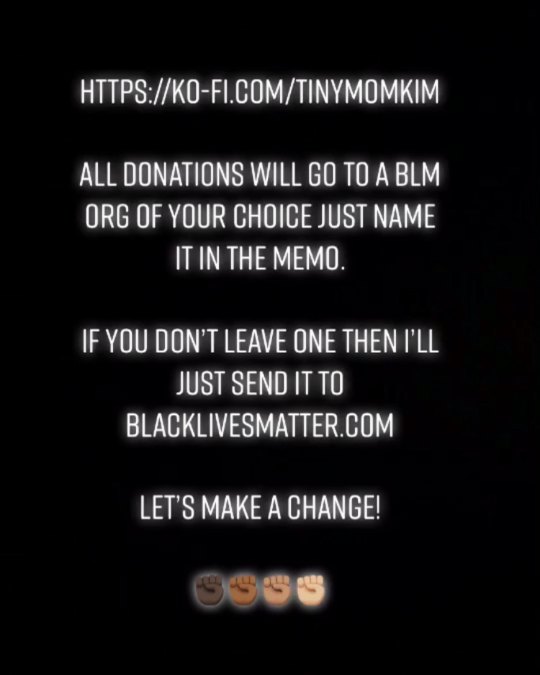
ALL donations will go directly into a Black Lives Matter org of your choice just let me know in the memo where you want it to go. If you don’t leave on then it’ll go to blacklivesmatter.com Keep sharing, protesting, educating, donating...keep doing everything you are doing!!! Change is coming!!! Link in bio❤️ #blacklivesmatter #nojusticenopeace #cosplayersforblacklives #asiansforblacklives #koreansforblacklives #dontletup #allblacklivesmatter https://www.instagram.com/p/CBHdzYGHEuz/?igshid=116srpw4wvvud
#blacklivesmatter#nojusticenopeace#cosplayersforblacklives#asiansforblacklives#koreansforblacklives#dontletup#allblacklivesmatter
2 notes
·
View notes
Photo
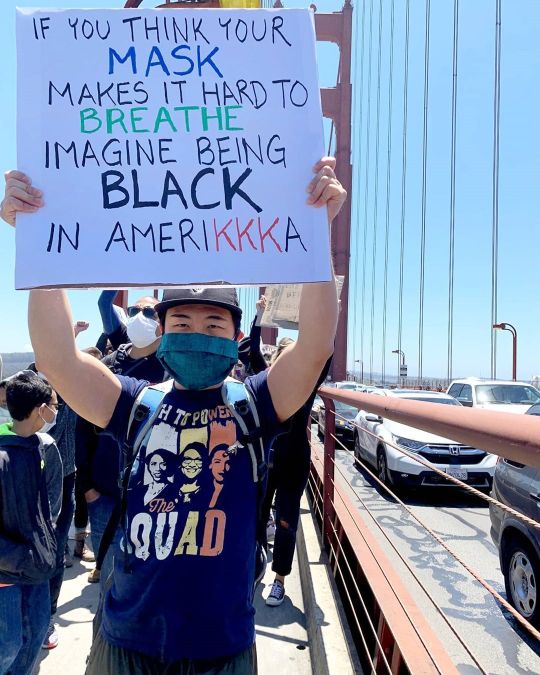
For #GeorgeFloyd, #BreonnaTaylor, #AhmaudArbery, and the countless others who've had their lives taken away from them by a broken system fueled by racism and police brutality! #blacklivesmatter #saytheirnames #blm #asiansforblacklives https://www.instagram.com/p/CBHPEgQBuZu/?igshid=13x3h11q36d12
2 notes
·
View notes